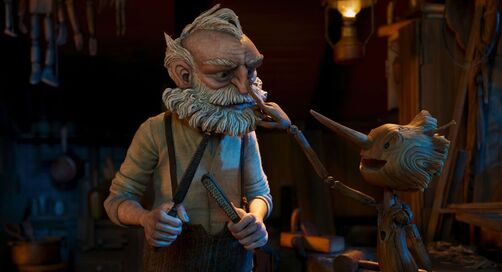B- | A troublemaking puppet is granted life so he can comfort a grieving woodcarver. Directed by Guillermo del Toro Starring David Bradley, Gregory Mann, and Ewan McGregor Review by Jon Kissel |

By setting Pinocchio in Mussolini’s Italy, Del Toro’s long fascination with fascism merges with his penchant for dark fairy tales. Mixing wondrous fantasy with brutal reality worked for Del Toro before in his creative peak, Pan’s Labyrinth, so why shouldn’t it work here? What elevated Pan’s Labyrinth was the distinct separation between its two worlds, but that’s impossible in a story about a puppet who comes to life. Instead of a comparison between fantasy and reality, Pinocchio blends the two in a way that breaks the film’s tone. The first time Pinocchio dies, it’s another adventure for the puppet, but his body’s being cradled by Gepetto back in the world. When Mussolini orders Pinocchio’s death after an insulting circus act, his fellow performers are being imprisoned or worse while he’s rejoicing in his immortality. The film chooses to set itself in this period and then ignores what that would actually mean, trading any kind of truth for a cheap contemporary chance to poke fun at the ridiculousness of fascists in a period of concern about rising fascism.
The historical carelessness sits alongside an unconsidered plot. Pinocchio creates rules for its resurrections, and misses every opportunity to use them to create humor, stakes, or pathos. So much is imaginable if death is meaningless for a troublemaking puppet. So many better movies have used exactly this mechanic to great effect, but Del Toro’s attentions are pulled towards dead-end side characters whose arcs aren’t completed and whose final states are ignored. Even away from this fantasy element, simple things like the spatial geography of set pieces are hand-waved away. Why show Pinocchio struggling to pull a heavy weight out of the ocean if the film just cuts to him successful on the shore? Why go to a fascist training camp for boys if you’re going to soften it to sub-Jojo Rabbit levels? A pivotal scene by Sebastian (not named Jiminy probably as some kind of rights end-around) boils down to whining about how hard they tried and that should be enough. One can almost hear exhausted stop-motion animators making this same plea to the viewer, like they can’t move these figures a tiny amount more to patch up these major oversights.
Sebastian’s begging is directed towards Death in a film with another godlike character that holds supreme power over anyone he comes across. Pinocchio’s depiction of Mussolini has him as a childlike dullard, comically short and mouth-breathing. The immediate thought is of The Great Dictator, Charlie Chaplin’s exercise in Hitler satire that is exactly as toothlessly earnest. Pinocchio’s big act of rebellion against the Italian state is to sing a song about Mussolini’s poop and farts. What is the value of this? What is the ethic being conveyed by the film? Hitler thought The Great Dictator was hilarious. Why do people as separated by time as Chaplin and Del Toro think they can take shameless people down a peg, like enough memes with Trump and Putin en flagrante will cause them both to resign in humiliation? Combining the Sorkin-esque trope of making a good speech at the end with the useless pointing out of how absurd authoritarians so often are is the equivalent of getting a splinter under a fingernail.
As occasionally irritating and unimpactful in total as Pinocchio is, Del Toro’s craftmanship and his affinity for actors keeps it from the doldrums. Bradley’s effective as Gepetto, embodying his grief and his irascibility. Swinton is great at everything, including voicing echo-y demigods, while Christoph Waltz gets up to his old tricks as the villainous circus owner. Mann seems to have been cast for maximal childishness, and his high-voiced rendition of Pinocchio is completely free of irony and bubbles with the thrill of discovery around every corner. All are backed by an autumnal aesthetic likely brought by co-writer Patrick McHale, whose animated miniseries Over the Garden Wall is one of the great accomplishments of the 2010’s. The cozy warmth of the film blends with all the wood in Gepetto’s shop and on Pinocchio himself, and it’s easy to imagine this film, were it better, joining Over the Garden Wall in a fall rotation. Instead, Del Toro’s dream project for almost fifteen years is more of a blown opportunity. Perhaps success and broad acclaim has dulled his edge. Get thee to a woodworker so that point can be honed. C
 RSS Feed
RSS Feed